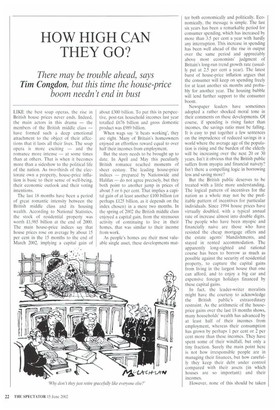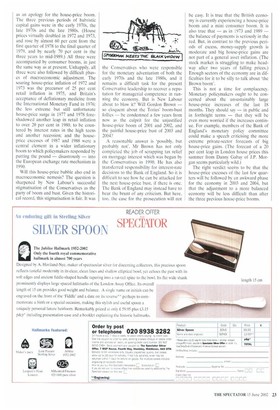HOW HIGH CAN THEY GO?
There may be trouble ahead, says
Tim Congdon, but this time the house-price
boom needn't end in bust
LIKE the best soap operas, the rise in British house prices never ends. Indeed, the main actors in this drama — the members of the British middle class — have formed such a deep emotional attachment to the object of their affections that it lasts all their lives. The soap opera is more exciting — and the romance more intense — at some times than at others. That is when it becomes more than a sideshow to the political life of the nation. As two-thirds of the electorate own a property, house-price inflation is basic to their sense of well-being, their economic outlook and their voting intentions.
The last 18 months have been a period of great romantic intensity between the British middle class and its housing wealth. According to National Statistics, the stock of residential property was worth £1,985 billion at the end of 2000. The main house-price indices say that house prices rose on average by about 15 per cent in the 15 months to the end of March 2002, implying a capital gain of about £300 billion. To put this in perspective, post-tax household incomes last year totalled £676 billion and gross domestic product was £989 billion.
When wags say 'it beats working', they are right. Many of Britain's homeowners enjoyed an effortless reward equal to over half their incomes from employment.
But the story needs to be brought up to date. In April and May this peculiarly British romance reached moments of sheer ecstasy. The leading house-price indices — prepared by Nationwide and Halifax — do not agree precisely, but they both point to another jump in prices of about 5 or 6 per cent. That implies a capital gain of at least another £100 billion (or perhaps £125 billion, as it depends on the index chosen) in a mere two months. In the spring of 2002 the British middle class enjoyed a capital gain, from the strenuous activity of continuing to live in their homes, that was similar to their income from work.
As people's homes are their most valuable single asset, these developments mat
ter both economically and politically. Economically, the message is simple. The last six years has been a remarkable period for consumer spending, which has increased by more than 3.5 per cent a year with hardly any interruption. This increase in spending has been well ahead of the rise in output over the same period and appreciably above most economists' judgment of Britain's long-run trend growth rate (usually put at 2.5 per cent a year). The latest burst of house-price inflation argues that the consumer will keep on spending freely for at least another six months and probably for another year. The housing bubble will lend further support to the consumer boom.
Newspaper leaders have sometimes adopted a rather shocked moral tone in their comments on these developments. Of course, if spending is rising faster than incomes, the savings ratio must be falling. It is easy to put together a few sentences on the imprudence of reduced savings in a world where the average age of the population is rising and the burden of the elderly will be increasing over the next 20 or 30 years. Isn't it obvious that the British public suffers from myopia and financial naivety? Isn't there a compelling logic in borrowing less and saving more?
But the British public deserves to be treated with a little more understanding. The logical pattern of incentives for the nation as a whole may not be the profitable pattern of incentives for particular individuals. Since 1994 house prices have virtually doubled, with a typical annual rate of increase almost into double digits. The people who have been myopic and financially naive are those who have resisted the cheap mortgage offers and the estate agents' blandishments, and stayed in rented accommodation. The apparently long-sighted and rational course has been to borrow as much as possible against the security of residential property, to capture the capital gains from living in the largest house that one can afford, and to enjoy a big car and expensive foreign holidays financed by these capital gains.
In fact, the leader-writer moralists might have the courtesy to acknowledge the British public's extraordinary restraint. As the arithmetic of the houseprice gains over the last 18 months shows, many households' wealth has advanced by at least half of their incomes from employment, whereas their consumption has grown by perhaps 1 per cent or 2 per cent more than these incomes. They have spent some of their windfall, but only a tiny fraction. Surely the main point here is not how irresponsible people are in managing their finances, but how carefully they keep their debt under control compared with their assets (in which houses are so important) and their incomes.
However, none of this should be taken as an apology for the house-price boom. The three previous periods of hubristic capital gains were in the early 1970s, the late 1970s and the late 1980s. (House prices virtually doubled in 1972 and 1973, and rose by almost 60 per cent from the first quarter of 1978 to the final quarter of 1979, and by nearly 70 per cent in the three years to mid-1989.) All three were accompanied by consumer booms, in just the same way as at present. Unhappily, all three were also followed by difficult phases of macroeconomic adjustment. The soaring house-price inflation of 1972 and 1973 was the precursor of 25 per cent retail inflation in 1975, and Britain's acceptance of deflationary medicine from the International Monetary Fund in 1976; the less extreme but still unfortunate house-price surge in 1977 and 1978 foreshadowed another leap in retail inflation to over 20 per cent in 1980, to be countered by interest rates in the high teens and another recession; and the houseprice excesses of 1987 and 1988 were a central element in a wider inflationary boom to which policymakers responded by putting the pound — disastrously — into the European exchange rate mechanism in 1990.
Will this house-price bubble also end in macroeconomic nemesis? The question is sharpened by New Labour's successful stigmatisation of the Conservatives as the party of boom and bust. Given the historical record, this stigmatisation is fair. It was the Conservatives who were responsible for the monetary adventurism of both the early 1970s and the late 1980s, and it remains a difficult task for the present Conservative leadership to recover a reputation for managerial competence in running the economy. But is New Labour about to blow it? Will Gordon Brown — so eloquent about the Tories' boom-bust follies — be condemned a few years from now as the culprit for the unjustified house-price boom of 2001 and 2002, and the painful house-price bust of 2003 and 2004?
A reasonable answer is 'possibly, but probably not'. Mr Brown has not only completed the job of scrapping tax relief on mortgage interest which was begun by the Conservatives in 1990. He has also transferred responsibility for interest-rate decisions to the Bank of England. So it is difficult to see how he can be attacked for the next house-price bust, if there is one. The Bank of England may instead have to bear the brunt of any criticism. But here, too, the case for the prosecution will not be easy. It is true that the British economy is currently experiencing a house-price boom and a mini consumer boom. It is also true that — as in 1973 and 1989 — the balance of payments is seriously in the red. But, in contrast to the previous periods of excess, money-supply growth is moderate and big house-price gains are not part of a general asset inflation. (The stock market is struggling to make headway after two years of falling prices.) Enough sectors of the economy are in difficulties for it to be silly to talk about 'the Brown boom'.
This is not a time for complacency. Monetary policymakers ought to be concerned about the unsustainably large house-price increases of the last 18 months. They should say — in public and in forthright terms — that they will be even inure worried if the increases continue. For example, members of the Bank of England's monetary policy committee could make a speech criticising the more extreme private-sector forecasts of big house-price gains, (The forecast of a 20 per cent leap in London house prices this summer from Danny Gabay of IP. Morgan seems particularly wild.) The right verdict seems to be that the house-price excesses of the last few quarters will be followed by an awkward phase for the economy in 2003 and 2004, but that the adjustment to a more balanced economy will be less difficult than after the three previous house-price booms.



































































 Previous page
Previous page